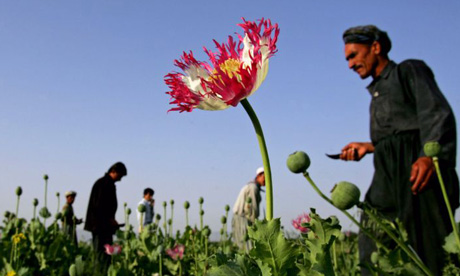• EU agency fears glut and reversal of deaths decline
• UK tops cocaine abuse table for fifth year in row

Afghan farmers in a poppy fi eld: Helmand province, centre of British military operations, accounts for over half of the opium crop. Photograph: Ahmad Masood/Reuters
A glut of opium on the world market, fuelled by a record Afghan harvest, threatens a new heroin crisis in Britain, the European Union's drug agency warned yesterday. The agency's annual report also confirms that the UK remains at the top of the European league table of 27 countries for cocaine abuse for the fifth year in a row. The UK accounts for 820,000 of the 4 million Europeans who have "recently used" cocaine.
But the agency also reports that there are "stronger signals" of the declining popularity of cannabis across Europe, especially among British school students.
Nevertheless the drug experts say that a quarter of all Europeans - 71 million people - have tried cannabis at some time in their lives.
The heroin warning from the European monitoring centre for drugs and drug abuse follows two record opium harvests in Afghanistan of 8,200 tonnes in 2007 and 7,700 tonnes this year. The harvests represent 90% of the world's illicit opium production with Helmand province, the centre of British military operations, accounting for over half of the crop.
"While favourable weather conditions have boosted harvests, the recurrent conflicts, because of the destruction, poverty and general insecurity that they entail, are likely to be an important factor in explaining the increases in opium production," says an agency study monitoring the supply of heroin into Europe.
The EU agency says that "alternative development" measures to persuade farmers to switch to other crops are having a very limited impact. It says that in eastern Afghanistan insecurity, lack of water, poor roads and increases in fuel costs have combined with declining prices for legal crops such as onions, which may make it difficult to sustain reductions in poppy cultivation in the future.
In Helmand, where opium poppy continues to grow in abundance, the security situation including the threat of roadside robbery and the proliferation of insurgent checkpoints make it sometimes impossible to get legal crops to urban markets.
"The latest data, while showing an overall reduction in production, point to increasing production in southern Afghanistan, in particular in Helmand province, where around 70% was produced in 2008," the study concludes.
The EU is worried that these record harvests threaten to end the "slowly improving" heroin situation in Britain and across Europe and reverse the decline seen in heroin-related deaths.
Seizures have doubled in Turkey, an important transit country, and are 20% up in Britain. The EU drug experts fear that the recent decline in heroin-related deaths in Britain - down from 2,171 in 2001 to 1,979 in 2005 - will be halted and even reversed as a result of a glut of much cheaper and possibly more potent heroin entering Britain. "Current evidence does not point to an epidemic growth in heroin problems as experienced by most of Europe in the 1990s," said the EU drugs agency director, Wolfgang Gotz. "Nonetheless, we cannot ignore the threat posed by the glut of heroin now available on the world market, the concerns raised by indicators of heroin use, or signs that synthetic heroin may be a growing problem. Vigilance is clearly required."
Britain's continuing position at the top of the league table of 27 EU countries for cocaine abuse is based on the fact that 12.7% of young adults aged 15 to 34 have used the drug.
Typical cocaine users in Britain are now just as likely to be poor working class young men as wealthy City traders.
The latest school surveys show that 5% of 15- and 16-year-olds have tried it. Cocaine use in Europe is highest in Britain and Spain. It has stabilised in both countries in recent years but at a level that is approaching American consumption. The increasing number of Europeans using the drug - 4 million last year, the EU estimates - reflects its recent growth in Italy, Denmark and Ireland.
The growing popularity of cocaine has been matched by declining use of amphetamines.
There is encouraging news about cannabis consumption in Britain. While the UK consistently had the highest levels of cannabis use among schoolchildren in the early and mid-1990s in this European survey, it has seen the sharpest decline in its popularity of any EU country.
Britain is now fourth in the Euro-league cannabis table amongst 15- to 24-year-olds, with 39.5% saying they have tried it at some time, and 12% saying they have used it in the last month.




No comments:
Post a Comment